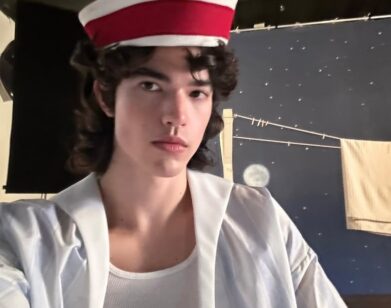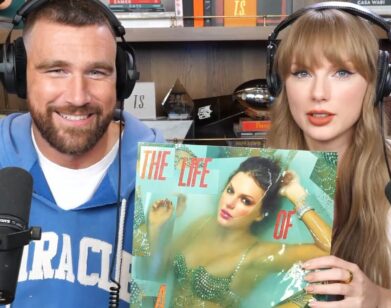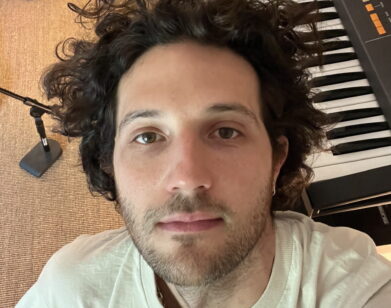An Older, Wiser Weyes Blood

ABOVE: WEYES BLOOD IN NEW YORK, AUTUMN 2014
At 15, Natalie Mering started writing and recording songs under the name Weyes Blood as a way of shirking the trappings of the hardcore scene in her hometown of Bucks County, Pennsylvania. A self-taught guitarist and powerful singer, she picked up a four-track recorder to help build up and flesh out her dreamy folk compositions, which later graduated to fuzzier, more experimental realms. In conversation today, Mering still seems wise beyond her 26 years. She’s soft-spoken but authoritative, two qualities that transfer seamlessly to her singing voice—a strong, resonating vibrato that she attributes as much to her childhood choir stint as she does to her love of Harry Nilsson records. “In the past four years I’ve been trying to find a resonance in my voice that’s powerful, but also conversational,” she says. “I don’t like singing that sounds too uptight and I don’t like singing that sounds too blown out. It’s all about finding that sweet middle ground.”
The result of her quest is The Innocents, out today via Mexican Summer. Unlike her hissy, sometimes noisy home recordings, The Innocents features a crisper, cleaner take on Mering’s haunting folk arrangements, as well as a staggering display of her vocal contortions. Most importantly, though, the record finds Mering beautifully navigating that chilly, isolating space between youth and adulthood.
ALY COMINGORE: Hi. How are you? Where are you?
NATALIE MERING: Hi. I’m well. I’m in New York. You’re in L.A.?
COMINGORE: Yeah, a little bit north of L.A., in Santa Barbara.
MERING: love Santa Barbara. I was born in L.A. In Santa Monica, actually.
COMINGORE: How long have you been on the East Coast?
MERING: Well, I was born in Santa Monica, then we lived in the Bay Area for a just a little bit, then we moved to Pennsylvania in 1999.
COMINGORE: Did you go straight from Pennsylvania to New York City?
MERING: No—I lived in Portland, Oregon and Baltimore, Philly, and then Kentucky before New York. I’ve lived in a lot of places. [laughs]
COMINGORE: Was there a lot of music around growing up?
MERING: My parents are both musicians, actually. My dad was a real working musician in the late ’70s and early ’80s. He had a band that was signed to Elektra/Asylum and they would perform at like Madame Wong’s and Whiskey A Go Go all the time. Jack Nitzsche produced their first record. It was this kind of crazy weird new wave Bruce Springsteen meets Weather Report. Then he became a Christian and got married and started a family and kind of put music on the side because it wasn’t what he wanted to pursue anymore. And my mom just always wrote songs, but she didn’t record her album until she was in her 50s and she had the time and money to do it. She funded it herself.
COMINGORE: So did your dad put a guitar in your hands pretty early on?
MERING: Well, we were raised pretty sheltered and Christian. He would lead worships. I knew he played guitar, and there was a piano in the house and everyone would play the piano. But there was one night where my dad busted out the electric guitar and sat us down and started playing secular rock songs and kind of describing his past. Up until then, I didn’t know he was a semi-famous secular rock musician who opened up for The Knack. He had all these kooky stories; he dated Joni Mitchell and Anjelica Huston and did all this weird rock star stuff. I remember being a little girl—I was maybe 8 years old—and my mouth just kind of dropped open. That planted the seed for me. It was like, “Whoa, he did it but then he wanted to do the family thing.” I thought, “Well, maybe I’ll just go do it all the way.”
COMINGORE: I’ve always been curious about kids who grow up in strict religious households. How does the church fit into your life now?
MERING: You know, around 14 or 15 I rebelled against Christianity pretty hardcore. I was reading a lot of other esoteric Eastern philosophy and getting into everything that wasn’t dogmatic Christian. But I will say that it did kind of prime me for a more spiritual lifestyle. I didn’t walk away with bitterness, even though there was some condemnation. My parents were a little more on the hippie spectrum of Christianity—they weren’t liberal Christians by any means, they were pretty conservative—but they preached mostly about love and caring for people, so I grew up with a lot of compassion and empathy. I notice when I meet other friends of mine that were raised Christian sometimes we have similar model of sensitivity, whether to our advantage or disadvantage. [laughs] I’ve held on to that, and I still get down with spiritual practices and esoteric Christianity. Recently, I have embraced it more in terms of just not being ashamed. I’m not a dogmatic Christian and I don’t believe in the Bible literally, but I realized that Jesus is basically a very Zen dude. And I’m into a lot of Eastern philosophy. It’s kind of like theosophy; it’s about finding the relationships between all the great religions and focusing in on the good stuff.
COMINGORE: As a teenager, did you tend to gravitate towards female musicians?
MERING: No. I’m definitely a victim of some weird twisted form of not really relating to female musicians. Now I’m getting into them. It started with the Celtic ladies, like Enya and Anne Briggs. I love Catherine Ribeiro. I have always liked Nico, but for me I could never fully relate to Nico because I couldn’t relate to her life. I always felt like Nico had the advantage of being ridiculously gorgeous, and a part of being a female musician is kind of getting past your looks and just honing in on the music, which I think she totally eventually did. It’s just a shame that a lot of men initially prevented her from doing that.
COMINGORE: I feel the second record is the one where you’ve kind of worked out the kinks, you know a little bit more about what you want and how to get it. How do you feel like The Innocents compares to The Outside Room?
MERING: Well, I recorded The Outside Room completely myself—I played everything on there—so going into the next record I knew I wanted to work with some other musicians. I wanted to record things in the conventional way—like in a studio—and I wanted to try something that was a little more concise. It’s interesting because you go from one side of the spectrum to the other. In terms of porridge, this second record is kind of like the momma porridge; it’s not the perfect temperature, but it’s not extremely hot. I definitely feel like I’m still learning.
COMINGORE: Where did you end up recording?
MERING: Part of it was recorded in this really weird big house in Pennsylvania. It was winter and there was no heat, so we were all wearing parkas and gloves with the fingers cut out while we were recording. [laughs] And some of the parts were recorded in my apartment in Brooklyn. And all of the vocals and some of the band’s parts were re-recorded at the Mexican Summer Studio called Gary’s Electric, which is in Greenpoint, Brooklyn.
COMINGORE: Tell me more about the freezing cold house.
MERING: That was really fun. I was there with some really old friends of mine who wrote a lot of the drum and bass parts on the album. We jammed for like six months there and I wrote the songs and then gave direction for what I wanted the drums and bass to sound like, but those parts were written by Jacob Brunner, the drummer, and James Strong, the bassist. Jim lives in the freezing cold house and we’ve all been friends since we were kids, so it was kind of like the high school band that I never got to have. In high school no guys wanted to be in a band with me unless I was going to play bass or play grindcore or be in a scream-o band, so it was fun to finally have that experience of having my songs backed by a drummer and a bassist who were just as excited about it as I was. It was a very transcendent experience, but it was also a very youthful experience.
COMINGORE: Was there a catalyst to that period of writing for you?
MERING: The catalyst for a lot of the songs was a combination of factors from my early 20s and late teens that culminated. That’s why the record is called The Innocents. It’s about young love. It’s about my first real relationship that went really awry. It’s about the best summer of my life coming and passing. It’s just about youthful ideas and how you never can really prepare yourself for maturity without going through the pain and the mistakes. I think I found out through the last three or four years that you can’t make yourself exempt from suffering, no matter how smart or mature or stealthy you try to approach life. Everybody kind of has to learn the same lessons. You’ve got to learn how to get over your first love. You’ve got to learn how to forgive people that emotionally abuse you. You’ve got to learn how to let go in a lot of ways.
COMINGORE: As a kid, what did you want to be when you grew up?
MERING: An actress.
COMINGORE: If you could live anywhere in the world, where would it be?
MERING: New Mexico.
COMINGORE: Best meal you’ve ever had?
MERING: Hmm. I was camping with someone who was trying to woo me, which was very sweet of him. He had hunted a deer and he wrapped it up in sumac berries and spicebush leaves and he cooked it over an open fire with a stick. It was the most delicious piece of meat I had ever had, and it was probably cooked with the bushes that the deer had been eating before it died.
COMINGORE: I really hope you went on a second date with that guy. [laughs]
MERING: Oh, we dated. [laughs] There are some songs on the record about him.
WEYES BLOOD’S THE INNOCENTS IS OUT TODAY ON MEXICAN SUMMER. FOR MORE ON WEYES BLOOD, VISIT THE BAND’S WEBSITE.






